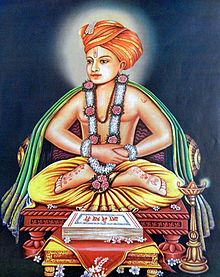Jnaneshwar
| Dnyaneshwar(ज्ञानेश्वर) | |
|---|---|
 |
|
| Religion | Hinduism |
| Philosophy | Adwaita, Varkari, Hinduism |
| Personal | |
| Born | Dnyaneshwar 1275 CE Apegaon, dist.Aurangabad, Maharashtra, India |
| Died | 1296 CE (Sanjeevan Samadhi at the age of 21) Alandi |
| Guru | Nivruttinath (elder brother) |
| Literary works | Dnyaneshwari, Amrutanubhav, Changdev Paasashti, Haripath, abhang devotional poetry |
| Honors | Sant (Saint), Dev (God) and Māulī (Mother) |
| dnyaneshawri is the first book to describe the translation of bhagwat geeta from sanskrit to marathi language through owya (means poetic sentence). | |
Dnyaneshwar or Dnyandev or simply Mauli (IAST: Jñāneśvar) (1275–1296) was a 13th-century Marathi saint, poet, philosopher and yogi of the Nath tradition whose Dnyaneshwari (a commentary on the Bhagavad Gita) and Amrutanubhav are considered to be milestones in Marathi literature.
Dnyaneshwar was born in 1275 (on the auspicious day of Krishna Janmashtami) in Apegaon village on the bank of Godavari river near Paithan in Maharashtra during the reign of the Yadava king Ramadevarava., The kingdom enjoyed peace and stability until invasions from the Delhi Sultanate started in 1296 CE. Arts and sciences flourished under the patronage of the Yadava kings and Maharashtra attracted scholars from all over India. However, this period also witnessed religious degeneration, sectarianism, superstition and ritualism which involved animal sacrifices to many local deities. Dnyaneshwar would later criticise the religious degeneration of the day in his magnum opus Dnyaneshwari. According to B. P. Bahirat, Dnyaneshwar emerged as the first original philosopher who wrote in the Marathi language, in this era.
Biographical details of Dnyaneshwar's life are preserved in the writings of his contemporary Namdev and his disciples Satyamalanath and Sachchidanand. The various traditions give conflicting accounts of details of Dnyaneshwar's life. The date of composition of his work Dnyaneshwari (1290 CE), however is undisputed. According to the more accepted tradition on Dnyaneshwar's life, he was born in 1275 CE and died in 1296 CE.
Dnyaneshwar's father Vitthalapant was the kulkarni (hereditary accountant, usually Brahmin, who maintained land and tax records in villages) of a village called Apegaon on the banks of the Godavari River in Maharashtra, a profession he had inherited from his ancestors. He married Rakhumabai, the daughter of the kulkarni of Alandi. Even as a householder, Vitthalapant longed for spiritual learning. His disillusionment with life grew as a result of the death of his father and because he had no children from his marriage. Eventually, with his wife's consent, he renounced worldly life and left for Varanasi to become a sannyasin (renunciate).
...
Wikipedia
